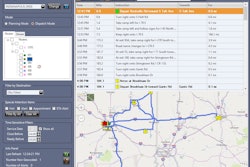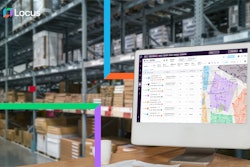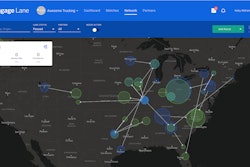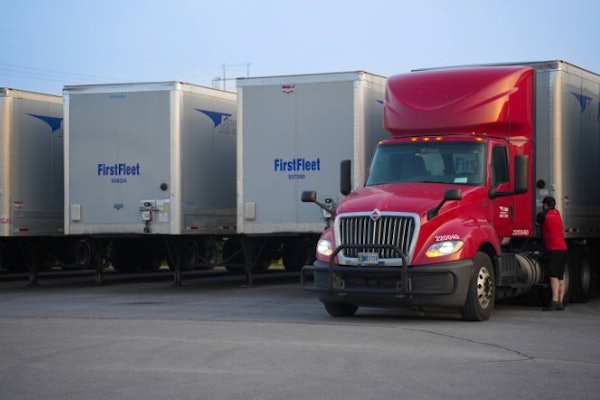The truckers in Katherine Lehman’s family are pretty old school in their profession, even to the point of using paper maps to plan routes. The trucking industry has been slower than others to adopt technology, but that is changing with companies like Onfleet – where Lehman serves as director of digital marketing – that offers mapping and route optimization solutions.
At Wilson Logistics, all trucks are equipped with onboard telematics that assist with routing and mapping, but it remains the responsibility of every driver to properly plan each trip and make accommodations for delays, said Chief Operating Officer Bruce Stockton. That could mean using a paper map or a navigational system, and though many carriers have upgraded from paper and pen operations, even basic navigational systems aren’t optimal anymore.
To drive efficiency, it has become even more important for carriers to invest in route-optimizing technology, which is especially true as the country will soon see the welcomed challenges that come with President Biden’s infrastructure bill, which includes $120 billion in Federal Highway Apportionments for highways and bridges for fiscal years 2022 and 2023 with over 2,800 bridge projects having been launched as of the one-year anniversary of the bill signing on Nov. 15.
Its expected impacts – including road closures, freight delays and potential increases in traffic violations, among other things – to the transportation industry is a regular dinner table conversation for Lehman and her family as she sits between truckers and civil engineers.
“I think the companies that are going to have the most successful projects and stay on schedule, and stay on budget – and just be more successful and eventually get more contracts – are going to be the ones utilizing tools like Onfleet to make their operations more efficient,” Lehman said. “In this day and age, the more efficient you can be and the happier you can keep your drivers, the more success you're going to see as a business. And one of the ways of doing that is by improving their routes with route optimization.
“They want to have nice routes that are planned for them so they can make their day as efficient as possible and make the most money possible,” she added. “So I think these tools that are making that process more streamlined for both the drivers and the dispatchers is bringing improvement to the industry as a whole.”
In anticipation of the road projects that will result from the bill, which includes provisions to upgrade transportation and supply chains, Lehman said Onfleet will use its new series B funding to implement more product improvements and expansions to make its systems more efficient.
John Elliott, CEO of Michigan-based Load One Transport (CCJ Top 250, No. 176) and chariman of the Truckload Carriers Association, said many modern dynamic systems are already developed using artificial intelligence to adjust for traffic and construction delays.
One of those is Trucker Path, which uses mapping systems like Google and Here to provide heavy-duty truck navigation, which includes bridge height and weight limits. But the more complex the roadways – made so by construction projects – the more complex the mapping/route optimization tool needs to be, said Chris Oliver, chief marketing officer at Trucker Path.
“A good chunk of the industry uses just those simple mapping tools,” he said, "but as things become more complex, and these work (zones) pop up, you're going to need something that's more robust and more capable than just the basics” – something that goes beyond mapping with bridge heights and weight limits with more real-time information.
Trucker Path offers those real-time insights via its “secret sauce” method in which truckers can go into the app and report road closures, reopenings and more. With constant feedback from its wide trucker community, drivers are made aware of issues almost instantly, he said.
George Shchegolev, co-founder of last-mile logistics route planner Route4Me, which also uses Google and other mapping vendors to aggregate traffic data, said it generally takes between two to three business days to start accruing data on planned road closures, at which point the model starts slowing estimated times of arrival (ETAs) and offers alternative routes that may yield a better result.
Shchegolev said Route4Me doesn’t expect the infrastructure projects to have a major impact on last-mile delivery because of existing technology.
“Is it going to slow things down? Yes. But I think … maybe a 5% to 10% decrease in performance in some areas,” he said. “If organizations use route-planning technology that takes into consideration traffic or road closures, nothing really changes because everything will be planned around it.”
But delays aren’t the only concern with these road closures. Stockton said it will also have an impact on safety.
Route optimization and mapping companies today offer more details beyond those closures with information like severe weather alerts or routing around areas deemed unsafe, for example. There’s also the matter of hours of service regulations.
“Safety standards cannot be dropped in spite of these challenges. Safety has to continue to remain priority number one for the trucking industry,” Elliott said. “The situation really, once again, highlights one of the greatest needs the Truckload Carriers Association and the American Trucking Associations have long advocated for: increased flexibility in the hours of service regulations. The industry is not asking for more driving hours. What we are asking for is to allow professional drivers to better manage and use their hours under the existing limits to enhance productivity and at the same time safety."
Stockton said Wilson Logistics will rely on assistance from governmental entities and contractors to educate fleets on those temporary changes to help maintain a safe environment for its drivers.
Despite its short-term challenges, he said these infrastructure projects are an overall positive.
“While those improvements come with construction delays and re-routing requirements, they are expected and worth the investment in our highway transportation system for the long term,” Stockton said. “With improvements come delays, route changes and some impact on overall transit times – all of which can and should be welcomed by our industry as an investment in our futures. Provided we have the information to plan ahead and know of any temporary route and scheduled delays, our customers also understand and accommodate those issues without jeopardizing the safety of our drivers and the motoring public. It’s what we do every day and is accepted as well as expected by our professional drivers.”












